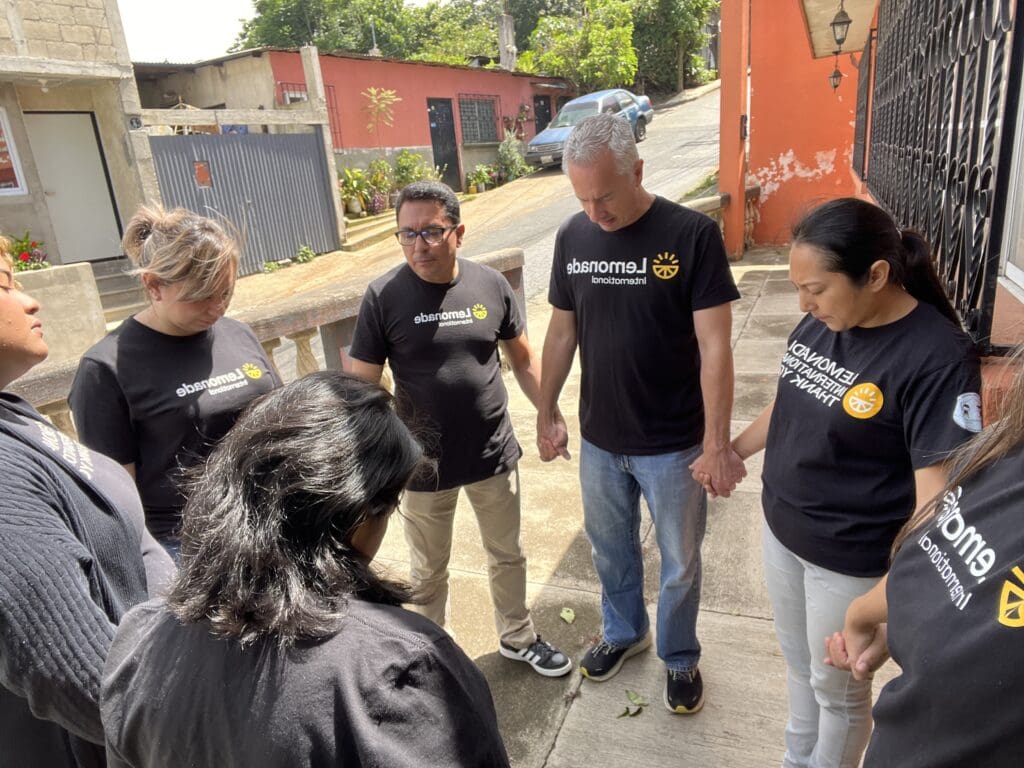
Dear friend of Lemonade,
As we prepare for Easter, Psalm 137:1-4 (NLT) says the following:
Ps. 137:1-4 (NLT)
Beside the rivers of Babylon,
we sat and wept as we thought of Jerusalem.
We put away our harps,
hanging them on the branches of poplar trees.
For our captors demanded a song from us.
Our tormentors insisted on a joyful hymn:
“Sing us one of those songs of Jerusalem!”
But how can we sing the songs of the Lord
while in a pagan land?
Lament is not a popular subject in many churches. As we reflect during Holy Week (“Semana Santa” in Guatemala), we are often anxious to get past the crucifixion of Good Friday and skip to the joy of Resurrection Sunday. However, in doing so we miss an important, in fact crucial, practice of Christian faith.
Psalm 137 is used in liturgy in Jewish, Eastern Orthodox, Catholic, Lutheran, Anglican and other Protestant traditions, and it is a communal lament about yearning for Jerusalem in the context of exile during the Babylonian captivity. The question of this Psalm is, how do our souls express joy or gratitude while in a foreign land? How could we possibly sing while we are surrounded by devastating loss?
In Guatemala the Saturday before Easter has a special name – “Holy Saturday.” For many Christians in Guatemala, Holy Saturday represents the importance of being faithful to Christ even in times of sorrow and despair, and it also reminds us to reflect and meditate on the sorrows of others. It’s amazing how serving others and being in solidarity with those who are suffering moves our focus away from our own challenges and brings hope to our perspective.
On a recent trip to Guatemala I had the opportunity to accompany youth in a gang prevention program during a visit to the San Juan de Dios Public Hospital, where many were waiting outside to be admitted or to hear news from loved ones. Our purpose was to pray for those in need and share meals with the hungry. Due to limited space at the hospital most family members are not allowed inside, including fathers of newborns, and patients who can’t afford services are required to wait on the sidewalk, exposed to the elements, sometimes for days. The stories of those waiting outside were heart-breaking – families who traveled all night from a rural town for surgery, a young man assaulted, beaten, and bleeding who was told to come back in a few days. Yet the prayers of the youth as we prayed for those in need were inspiring.
Lament has a powerful way of connecting us with others. It also connects us with God. While lament and grief are painful, they somehow mysteriously lead us to God’s healing and comfort. We feel grief, but we heal. We feel sorrow, but we’re not paralyzed by it.
Several years ago Andy Crouch, Kurt Keilhacker, and Dave Blanchard recorded a special podcast episode for Redemptive Edge that examined Psalm 137. The answer to the question – how could we possibly sing while lamenting in a foreign land – is actually this Psalm. Every other nation Babylon conquered disappeared. But Israel had prophets like Jeremiah and Daniel, leaders like Esther and Nehemiah, who found a way to sing the Lord’s song in a new way. As we read in the New Testament, Jesus is the greatest gift, the greatest victory after the exile. God forsook Jesus (just as Israel in the Old Testament rejected God), but this great sorrow led us to be able to sing the Messiah’s song today.
The more time I spend with the leaders we support in Guatemala City – particularly our Guatemalan staff like Lizza, Lucia, Jose, Irene, and others – the more I admire their tenacity and resilience. As our Guatemala Director, Lizza serves not only our staff, but whole communities and organizations, strategically empowering them to step forward with faith and love. Lucia encourages teachers and visits homes. Jose prepares teams and guides them through their own emotions as they process grief and suffering. Our team deals with such trauma, such heavy stories, yet they have a miraculous, inner strength to “mourn with those who mourn,” and to “rejoice with those who rejoice.” It’s not just authentic for leaders to grieve, it’s vital.
As we reflect on the crucifixion and resurrection this week, let’s not hurry past Good Friday. Take time to look at the pain, even if it’s uncomfortable, to thoughtfully process lament and grief, and to pray for those who are suffering. As we do so, allow God to lead us to healing and life. And remember, there are courageous leaders with whom we are partnering who are walking the same path in Guatemala.
Serving together,
Chal Knox
Executive Director
Lemonade International


